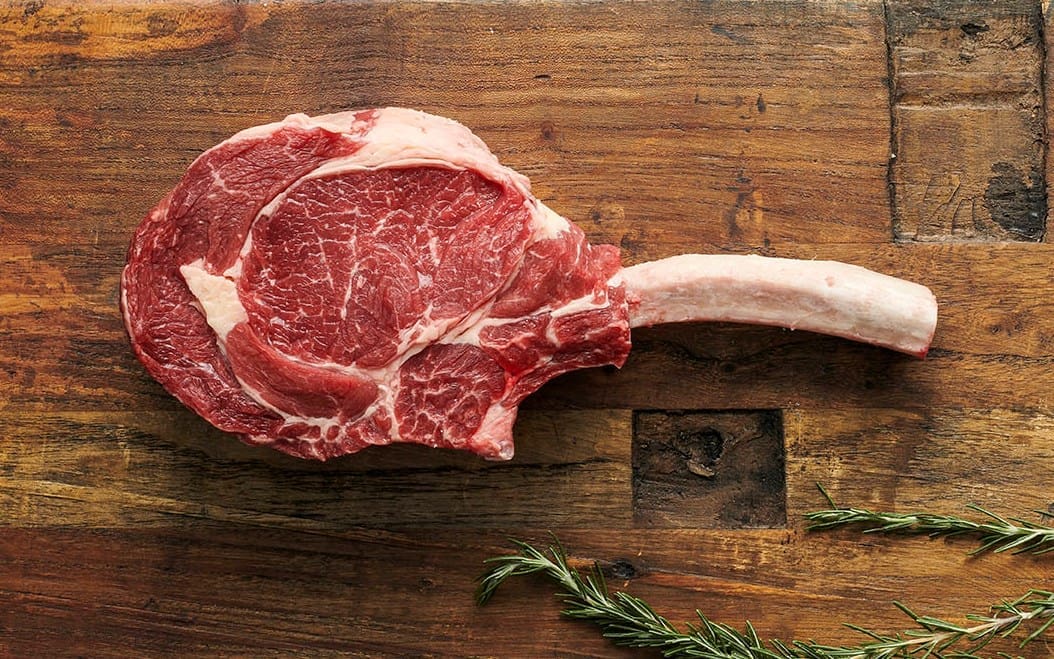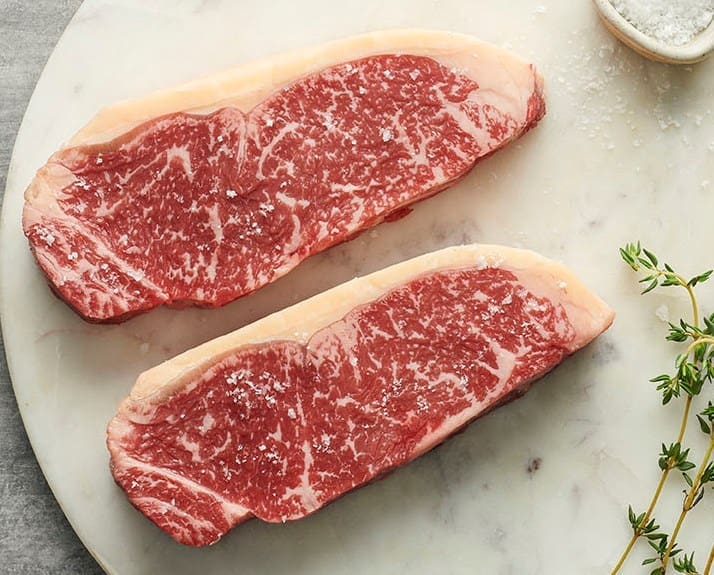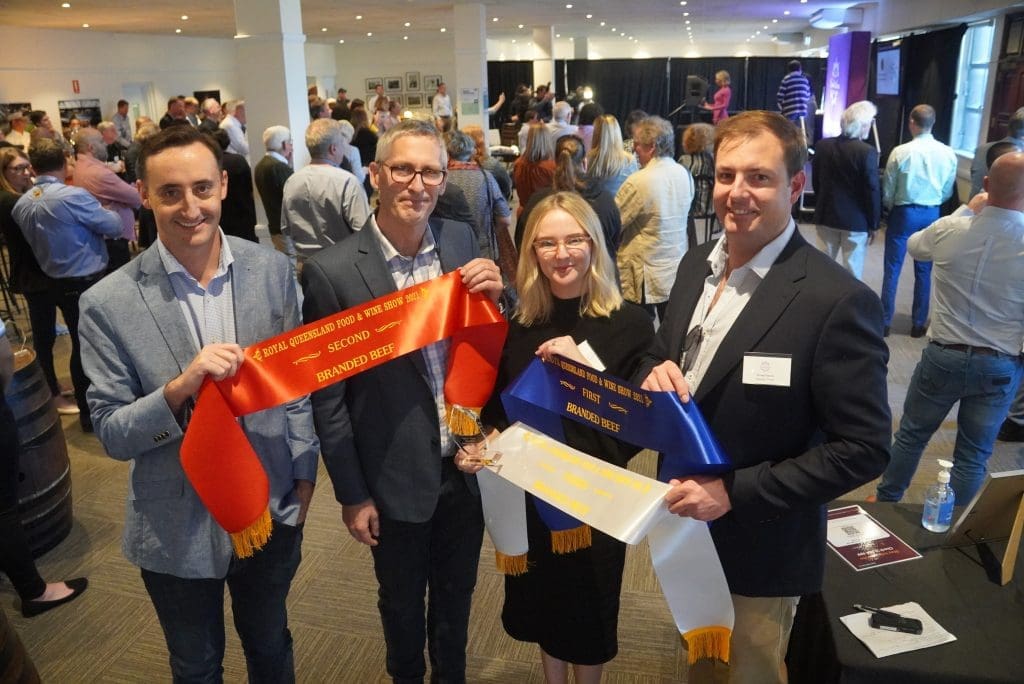
Sample of an OP rib from Paradigm Foods’ ground-breaking grassfed Wagyu cull cow program, Roam
Australian commercial beef brand managers are beginning to explore possibilities in differentiating beef harvested from better quality cull cows – provided it meets certain eating quality standards.
Brisbane Show’s annual branded beef competition finalised on Friday provided clear evidence of this, with an entry representing grassfed Wagyu cows culled on age, receiving a bronze medal – and defeating some of the biggest and best credentialed longfed Wagyu supply chains in the country along the way.
In what was arguably the biggest upset in the entire competition, Queensland based supply chain manager and exporter Paradigm Foods exhibited its Roam branded Wagyu cow beef in a class for Wagyu entries carrying marbling scores of 6 or less.
Paradigm Foods general manager Nick Thompson said the Roam brand program was launched 12 months ago, working closely with a group of mostly Queensland Wagyu Purebred and Fullblood Wagyu breeders, to ‘value-add’ their breeding cows culled on age.
 Most of the Wagyu cows entering the program are at least 6-8 years of age, with some out to 15 years.
Most of the Wagyu cows entering the program are at least 6-8 years of age, with some out to 15 years.
“Some of the marbling we have seen direct from cows off grass is incredible – which goes to show that maturity is obviously a clear driver of marbling,” Mr Thompson said.
“The marbling is noticeably finely-textured, which is a desirable trait in Wagyu beef, and one reason we believe Roam Wagyu stands out from the crowd. These cows are often 8-12 years old, have had six calves, and in some cases have seen three droughts through their life.”
Significantly, the cows are not fed an energy-dense ration like most Wagyu, being straight off grass. Several lines are run, including a main ‘never-ever’ program making claims around certified grassfed and no HGP or antibiotic.
Being non-fed Wagyu, marbling is inevitably more variable than more conventional longfed animals, but with the average being around scores two to four, Beef Central was told.
Processing takes place at the Meramist export-licensed plant in southern Queensland, currently numbering around 200 to 250 per week, but throughput will grow over time.
Moving as far as possible from the common practice of processing cows for ‘trim, alone,’ Paradigm grades its Wagyu cows entering the Roam program into four distinct production run categories:
- MSA marbling score 4+
- MSA marbling score 2+ (all graded and sold as Roam Brand)
- MSA Budget
- Non MSA manufacturing
From one production run, the supply chain packs more than 100 codes of products, which then go into value-added items including mince, steaks and dry-aged lines. The company is also looking to launch its own production of a Roam branded Wagyu burger.
“Not everything we produce falls into the Roam brand specs, however we pay our producers a premium for reaching this target,” Mr Thompson said. “We hope that in the future, this premium grows.”
Brand managers have capped meat colour accepted under the Roam brand at 4, with darker examples going into the non-MSA manufacturing pack.

“This is cow beef, and we’re not trying to dress it up as anything more than that,” Mr Thompson said. “We are actually celebrating the point that it is from an older animal, and darker meat colour is more likely.”
Most of the turnoff sold under the Roam brand program, including trim, is sold into the US, however some ‘really good’ domestic market niches have emerged in food service, Beef Central was told. Other product is sold into Asia.
Working differently to grow program
The Roam program is now looking to grow its original supply base out of Central Queensland into other Wagyu producing regions of Australia.
“To do this we think we have to work differently,” Mr Thompson said.
“Some Wagyu producers do not have the numbers to deliver a full truckload, so we do organize milk-runs and consolidate cattle from different producers in a district. We also depot cows at properties closer to processing to help smooth-out the production runs and help polish-up the cows,” he said.
These quality cows should not be treated as a commodity and we, as an industry, have to be better at recognising this
Paradigm has also started to do some really innovative things working with its producers:
- Feedback on carcase performance is considered critically important, so the company is working on computer ‘dashboards’ to help suppliers better understand what cattle performed, and why.
- It is also working with Wagyu producers to collect genetics information on high-performing cattle
- Paradigm is also working with producers to help them meet sustainability and carbon targets.
“Securing supply these days is so much more than just paying the highest price,” Mr Thompson said.
“It starts with the relationship, and then goes into everything else that we, as supply chain managers, can deliver for the producer. In this day and age, we believe that sustainability (on top of the obvious) means making more from what you have.”
“These quality cows should not be treated as a commodity and we, as an industry, have to be better at recognising this,” he said.
“These niche programs exist, and need to be exploited, and this is what we try to specialise in our business. We love working with farmers and helping connect them to the consumer, and in doing so, providing a service of value.”
Since Paradigm launched the Roam brand program last year, cow prices have reached record levels, which has inevitably made it even more difficult to continue to pay a ‘brand premium’.
“But this program is a credit to our key suppliers, who have stuck with us across this time, and they will be rewarded in the long-term when the cycle inevitably turns again,” Mr Thompson said.

Paradigm Foods Nick Thompson, Alister Ronald, Clare Ross and Richard Braund, with their first, second and third-placed ribbons from Brisbane’s branded beef competition on Friday, for the company’s Icon crossbred Wagyu and Roam grassfed Wagyu cow programs
Europe has tradition of beef from aged animals
Parts of Spain, France and Italy have for centuries had a niche tradition of celebrating the qualities of full-flavoured beef from older animals.
Beef Central’s inquiries around the industry suggest the only other aged cow branded program of any real significance in the Australian beef industry is HW Greenham’s Vintage Beef Co grassfed program, based on both Wagyu and Angus cull females, produced out of Tasmania.
It’s been known for decades that well-fed older cows have a propensity to marble, and the HW Greenham’s Vintage program has a minimum marbling score of 2, with a separate Reserve program, 3+.
One of Brisbane’s hottest young chefs, Callum Gray, features Greenham’s Vintage aged cow cuts on his menu in his rustic inner city Italian diner, Bianca, where the waiting list for bookings stretches weeks ahead for most of the year.
- Beef Central will report on his impressions of the Vintage aged product since opening Bianca’s doors two months ago, in an upcoming article.
